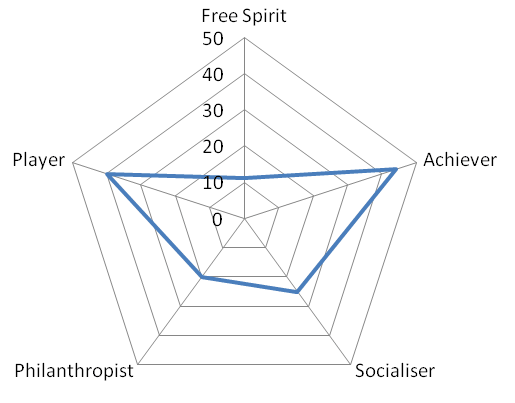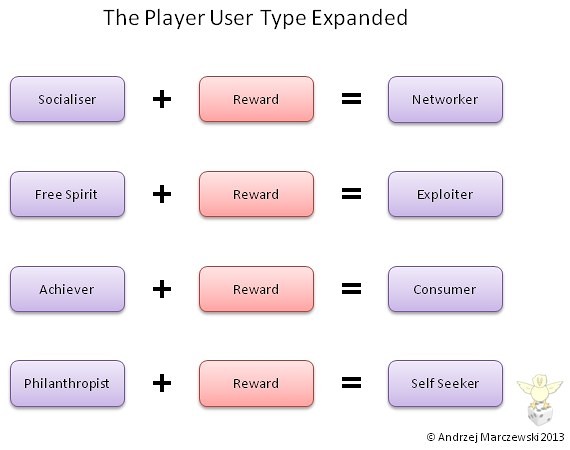Note, when I am talking about user types, I am referring to my classification user types found here! Since I released the User Types Hexad, I speak less about the extrinsic group outside of calling them Players. To help;
Consumer=Player Achiever.
Self Seeker=Player Philanthropist.
Networkers=Player Socialiser.
Exploiter=Player Free Spirit.
Status in the realms of gamification is a funny thing. It is something that we all agree is important, but seem divided on its nature. Some talk about it as an intrinsic motivator others extrinsic.
In the animal kingdom status is simple, the higher your status the more good stuff you can get. The Alpha dog gets more food, gets more women and has more chance of their gene pool continuing than any other animal in the pack. What may seem like a very extrinsic symbol of power and prowess is in fact the most basic of animal instinct, pure intrinsic motivation, life. It does come at a price, the higher the status the more people will come gunning for you.
And so it is in out day to day lives. People with higher status get more. Status can be many things in our lives. Intelligence, looks, the school you attended, where you live, money – all have a status attached to them. Some help you to find partners, other better jobs and so on. Status is important and has a high motivational value – whether we think it does for us or not.
In gamification this all needs to be simplified a little. A gamified system at work is unlikely to lead to you finding your next partner, or making you better looking. However, status when it is well thought out within the system, can still be a good driver.
The way I see it, there are two basic kinds of status. Visible and hidden – Extrinsic and Intrinsic.
Visible vs Hidden
Visible or Extrinsic status is the easier one to deal with. This kind of status can be awarded with all of our favourite extrinsic rewards. Leaderboards, points, achievements and rewards. All of these help to define a persons status in your system. The top person on the leaderboard is obviously (in most cases) doing something good as the system defines it. They are the ones who you should go to to ask things, they are the best at what they do. For some, this is a high motivator. In my classification of user types, this kind of status can be important to three different types, Consumers, Self Seekers and Networkers. They want the status because of what it can give them, not what it means to others.
- Consumer types, want status because it gives them access to more “stuff” via the system.
- Self Seekers see status as a way to show others that they are the best, this in turn will encourage other users to come to them more often – thus earning the self seeker more credits, rewards etc.
- Networkers are a little less obvious. For them, social connections mean rewards, therefore social status is of high importance. They higher their social status, the higher their perceived importance. This leads to things like higher Klout scores, Kred scores and the like. This all leads to one thing, rewards.
Hidden or Intrinsic status is more subtle and a little harder to implement. Intrinsic status is all about using status to fulfil individuals in a way that does not always need to lead to some sort of tangible rewards.
- Achievers often look for status, but not as a way to show off their prowess to others, but to prove to themselves that they have achieved something. Higher status in something proves that you are on the way to mastery, a massive intrinsic motivator for an achiever type.
- Philanthropists look at status as way to guide more people to them. They get pleasure from giving what they can to others (in a gamified system this is often in the form of help). If they are top of the leaderboard for questions answered and have the most votes from other users, they are likely to get more people asking them for help. This all helps the philanthropist user find purpose.
- Socialisers have a fairly obvious desire for status. Higher social status = more people to connect with. For them, it is about the enjoyment of meeting and interacting with new people, not getting an extrinsic reward, joy is very intrinsic! This puts social status clearly in the realms of relatedness.
As you can see, for the more intrinsically motivated users, seemingly extrinsic status actually fulfils much more intrinsic desires for them.
However you choose to use status in your gamified system, it is obvious that it is important to many types of users, just in different ways. The same method of awarding and displaying status will work for multiple user types, you just have to ensure that as well as the reward aspect of the status, you include some form of social discovery element. If all people with status get is rewards, then socialisers and philanthropists will have nothing to engage them.
This is a great example of using extrinsic rewards to support intrinsic motivation.
Is status intrinsic or extrinsic? How about we settle for a little bit of both.
Similar Posts:
- A Question of Motivation
- User Types Test: Stats and conclusions
- User Types in Gamification – Part 2: Players and Balance





1 thought on “Status, motivation and primal instinct”